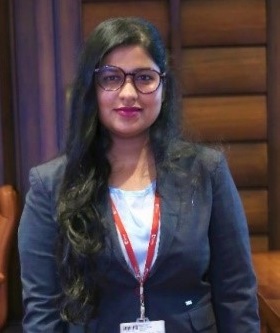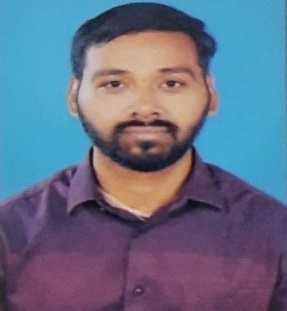
Research experience:
Dr. Gurudas Mane, received his Ph.D. from Hokkaido University and National Institute for Materials Science (NIMS), Japan. After Ph.D., he joined Max-Planck Institute, Germany as a post-doctoral fellow and worked on synthesis of tuneable Janus nanoparticles. He has also been awarded with INSPIRE Faculty award (in 2015-2016) by Department of Science and Technology (DST), Govt. of India to conduct research in materials chemistry at Bhabha Atomic Research Centre (BARC), India. His research outcomes were published in several high impact factor international journals. [1-4] He has more than 6 years of work experience in the synthesis of novel mesoporous materials such as metal doped mesoporous silica, N doped mesoporous carbons, Mesoporous carbon nitrides (MCN) and studied their applications in chemical sensing and photocatalysis. He worked extensively in developing high surface area N doped meosporous carbons from biopolymers, MCNs with different C/N stoichiometry [1-3] via nanocasting approach, semiconducting metal oxides and Janus nanoparticles [4].
Ongoing research activities:
His current research interest includes photocatalytic reduction of CO2 to value added products and photocatalytic water splitting by using nanocatalytic materials. He is also working on elucidating the CO2 adsorption pathways on the nanocatalyst surface and the real mechanism of CO2 reduction under photocatalytic and electrocatalytic conditions. Very recently, he started working on the synthesis of inorganic nano-catalyst materials for biodiesel production from waste cooking oil.
Current Academic and non-Academic Activities:
Key Publications:
For more details:
https://science.nmims.edu/faculty-and-research/faculty/gurudas-p-mane/
Current PhD Students:
|
Name: Rashmi Nautiyal PhD Registration Year: 2019 Research Area: Photocatalytic CO2 reduction and water splitting |

Research Project Summary: Increasing levels of CO2 in the atmosphere and its negative impact on the environment has stimulated efforts to develop technologies and processes that capture CO2 and convert it into reusable forms of carbon. Activation of CO2 requires a large input of energy due to its inert nature and chemically stable behaviour. Consequently, different reaction pathways like biological, chemical and thermal pathways become operational, resulting in poor product efficiency and selectivity. Thus, the discovery of a catalyst that promotes this reaction along a specific reaction pathway is highly desirable. Sun’s energy reaching the earth’s surface (1.3 × 105 TW) is 10,000 times higher than the present rate of consumption or demand.
Considering the scenario, researcher attempts to develop photocatalyst for splitting water and reducing CO2 to fuels (H2, CO, CH3OH, CH4) using solar energy. In order to achieve the goal, optimization of carbon based materials like g-C3N4 and g-C3N5 with selective doping and functionalization strategies have been implemented. The researcher aims to synthesize facile and cost effective photocatalyst for CO2 photoreduction and water splitting reaction.
|
Name: Anushree Chaturvedi PhD Registration Year: 2020 Research Area: Photocatalytic Hydrogen Generation |

Research Project Summary: Fossil fuels are depleting, Carbon emissions are on the rise, and both are anthropogenic. This creates an urgent need to pause, plan and launch towards developing clean and green energy technologies. In the meantime, Hydrogen introduces itself as the cleanest, reliable, eco-friendly, and sustainable form of energy in future Therefore, photocatalytic Hydrogen evolution by water splitting is a truly viable option to address increasing energy demand and environment concern.
Metal free graphitic carbon nitride as a photocatalyst has attracted significant attention due to its
There are a few gaps still to be bridged hence, we plan to create hybrid binary composites of graphitic Carbon Nitride for an advantageous system of photocatalysis and also to study the effects of different co-catalyst loading on similar applications. Our work shall uncover immensely potent noble-metal-free nano materials as the next generation catalysts in the water splitting reaction.
|
Name: Prachi Bhat PhD Registration Year: 2022 Research Area: Biodiesel from waste vegetable oil |

Research Project Summary: Due to variations and elevation of costs of fossil fuel production and the climate changes caused by their use, there is an increase in the search for alternatives that seek new energy sources. Biodiesel seems to be just the right solution for meeting the energy requirements of the future. A lot of research is going on around the world on biodiesel and utilising waste for biodiesel production and it has been reported as a renewable, green fuel with better engine emission properties. Overall, biodiesel production via heterogeneous catalysts is yet to be explored from an industrial standpoint because it has advantages over homogeneous catalysts such as simple recovery, reusability, and a cost-effective green process. In this context, my project proposes the development of novel heterogeneous catalyst materials with high surface area and abundant active sites for the transesterification process to realize the biodiesel production from waste vegetable oil.
|
Name: Sonal Rane PhD Registration Year: 2022 Research Area: Essential Oil Research- Plant chemistry and Authenticity analysis |

Research Project Summary: Essential Oils (EOs) are natural materials widely used in many fields all over the world and have become an integral part of everyday life. To check the presence/degree of adulteration in them, authentication is critical for both consumers and chemical companies.
Based on the physical properties or chemical components of essential oils, many crude methods have been developed in the past to assess the adulteration of high price oils. However, it is not possible to obtain a fingerprint of the natural origin oils with crude analysis. The analytical techniques employed for the detection of the volatile oil composition, are the gas chromatography mass spectrometry (GC-MS), and the conventional gas chromatography (gas chromatography flame ionization detection [GC-FID]), lined with the gas chromatography coupled to the isotope ratio mass spectrometry (GC- IRMS) instrumentation. This project aims to explore the potential of GC-IRMS to trace the authenticity of the samples, the biogenic pathways of the plants of origin, highlighting the presence of possible adulterant used to reconstitute the product or unveiling if different species were accidentally mixed or added intentionally.
|
Name: Avinash Laxman Hande PhD Registration Year: 2022 Research Area: Determination of Genotoxic or Carcinogenic impurities from different formulations/formulations packaging material. |

Research Project Summary: FDA has been investigating the presence of impurities in some medications, called nitrosamines, which are common in water and foods, including cured and grilled meats, dairy products and vegetables. If drugs contain levels of nitrosamines above the acceptable daily intake limits, FDA recommends these drugs be recalled by the manufacturer.
Nitrosamine impurities may increase the risk of cancer if people are exposed to them above acceptable levels and over long periods of time. Manufacturers are responsible for developing and using suitable methods to detect and limit unacceptable impurities, including any new impurities that may arise during manufacturing/packaging processes.
Scarcity of established protocols to conduct determination of Genotoxic or Carcinogenic impurities from different formulations/formulations packaging material makes this project significant as it would demonstrate and develop method to conduct these vital tests, so that efficacy of different formulations can be proven without any adverse effects.